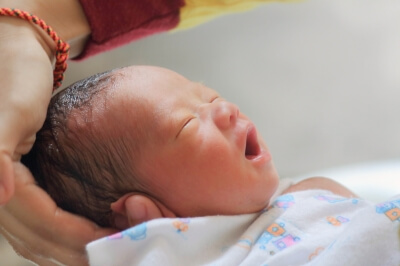
Each year, state Medicaid programs cover more than $1 billion to care for infants with neonatal abstinence syndrome (NAS) – a condition caused by opioid use during pregnancy. NAS often results in expensive hospital stays in order to treat the infant’s withdrawal symptoms, such as irritability, poor feeding, seizures, and respiratory distress.
Earlier this month, the Centers for Medicare & Medicaid Services (CMS) approved a new financing approach for these infants in West Virginia that may usher in an effective, lower-cost treatment option for state Medicaid programs struggling to cover the cost of NAS.
Infants born with NAS are typically treated in hospitals, including special care nurseries and neonatal intensive care units, and Medicaid payment for this treatment is costly. The average length of hospital stay for infants with NAS is 17 days, costing nearly $1.5 billion annually. About 80 percent of these hospital costs are covered by Medicaid.
Non-hospital settings can offer NAS treatment for infants with less severe symptoms at a lower cost — $600 compared to $2,600 in a special care nursery, or $4,000 in a neonatal intensive care unit. Until now, Medicaid coverage of NAS treatment has only included bundled payments to hospitals or fee-for-service payments to providers in non-hospital settings like neonatal withdrawal centers or outpatient follow-up clinics. West Virginia Medicaid recently received CMS approval to cover a new approach — a bundled payment for NAS services in non-hospital settings, referred to as NAS treatment centers.
West Virginia has been particularly hard hit by the opioid epidemic. According to the Centers for Disease Control and Prevention, West Virginia had the highest rate of deaths due to drug overdose in the United States in 2016, reaching 52 per 100,000 residents. It also has one the highest rates of NAS with 33.4 cases of NAS for every 1,000 hospital births.
There is currently one NAS treatment center in West Virginia, Lily’s Place, which provides a comprehensive array of services to prevent or reduce withdrawal symptoms among infants with prenatal exposure to opioids. It also provides education and counseling support to families and caregivers. As a designated NAS treatment center, Lilys Place will now be reimbursed by Medicaid through a prospective bundled payment that is designed to cover NAS treatment services such as pharmaceutical withdrawal management, withdrawal monitoring, developing a care plan, and therapeutic swaddling.
The bundled payment includes NAS services provided by registered nurses, licensed counselors, and social workers. Physician treatment services and room and board costs are not included in the bundled payment. West Virginia’s NAS treatment center model represents a cost-effective and patient-centered approach to treating NAS and supporting the whole family impacted by opioid use.
Since 2000, the number of pregnant women using or dependent on opioids nationwide increased five-fold, and there has been a corresponding five-fold increase in the number of infants born with NAS over the same period. Additionally, a 2014 study found that one in five women enrolled in Medicaid filled a prescription for an opioid during pregnancy. The drastic rise in opioid use during pregnancy and NAS reinforces the need for effective interventions that support the mother-infant dyad.
New clinical guidelines from the Substance Abuse and Mental Health Services Administration provide important guidance and resources for states, providers, and others caring for pregnant and parenting women with opioid use disorder (OUD) and their infants. These guidelines highlight evidence-based strategies for providing individualized care that promote the health of mothers and infants, including:
- Implementing screenings for substance use disorder and mental health comorbidities for pregnant women;
- Establishing community-based teams of clinicians to engage to support the pregnant women with OUD;
- Providing and managing medication-assisted treatment for pregnant women with OUD;
- Developing and managing a treatment plan for the postpartum period, a time when women are at higher risk for returning to substance use; and
- Screening, assessing, monitoring, and treating NAS for infants exposed to opioids.
This summer, the National Academy for State Health Policy (NASHP) will publish two policy briefs that explore state policies and strategies that promote the continuum of care for women with OUD over the course of their perinatal period, and support the health and well-being of young children impacted by the opioid epidemic.
Explore additional NASHP opioid epidemic resources:
- Intervention, Treatment, and Prevention Strategies to Address Opioid Use Disorders in Rural Areas
- Chronic Pain Management Therapies in Medicaid: Policy Considerations for Non-Pharmacological Alternatives to Opioids
- State Health Policymakers Look to Washington and Each Other to Fight the Opioid Epidemic.
For more information about NASHP’s work on the impact of opioids on women and children, and the role of Medicaid and other public programs contact Carrie Hanlon or Becky Normile.


